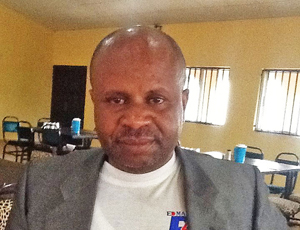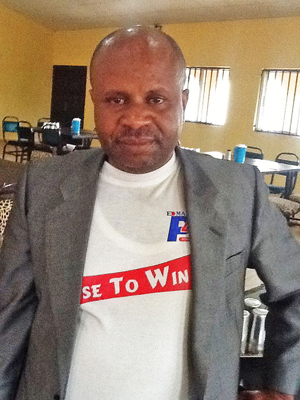
In the second part of a two part article, Nigerian evangelist Habibu Adam Mohammed talks to Morning Star News about the impact his conversion to Christianity had in his relationship with his family, how God has provided him with a new ‘family’ and his messages for both the persecuted church – and their persecutors…
Part two of a Lifestory special – for Part I, follow this link…
Confession
Soon his family heard about his conversion and confronted him.
He told them he was now a believer in Jesus. They gave him the option of either recanting and returning to Islam or facing the consequences of apostasy.

Habibu Adam Mohammed. PICTURE: Morning Star News
“My parents wanted to know what the reward was as they’d double it. I told my parents that these Christians promised me life in eternity. They offered me a new life in Christ Jesus.”
– Habibu Adam Mohammed, speaking about his conversion to Christianity from Islam.
“I told my parents, uncles, and grandfather, who was still alive at the time, that it was a difficult option they offered me, as I did not choose Jesus as my Lord, but He chose me as His redeemed,” he said. “I told them, ‘I did not enter to dwell in Him, but He entered into me to dwell in my heart. I don’t have the power to recant.’”
His parents asked how much money he had been offered to change his faith.
“I told them, ‘If I told you I was not offered anything, I would be lying, but the truth is that the Christians promised me a reward,’” he said. “My parents wanted to know what the reward was as they’d double it. I told my parents that these Christians promised me life in eternity. They offered me a new life in Christ Jesus.”
As they grew angrier and asked what had happened to him, he told them that the Habibu they knew was dead, but that Jesus Christ lived in him.
“I apologised for causing them inconveniences, disgrace, pains, and embarrassment, because I know they love me,” he said, “but I told them that they should know that it is God who has ordained that I will be called to receive Jesus as my Lord and Savior.”
They reminded him of what Islam prescribes for those who take the route he had taken, and he responded by saying he was not ignorant of the consequences. They asked whether he was ready to pay the price, and he told them, “My heart is ready; God is with me.”
Consequences
As Mohammed began to recount the violence that followed to Morning Star News, he broke down in tears.
Each of his relatives reached for whatever they could lay their hands on – sticks, clubs, knives, and machetes. They beat and clubbed him and stabbed him in the thigh. He struggled out of their grip, and they chased him out of the house, he said, his father’s voice echoing behind him, “A reward of three hefty bulls awaits anyone who brings me the dead body of Habibu, my son, who has now become an infidel.”
His wife and two children were taken away from him. He was thought to be a mad man for embracing Christ.
For 14 days, Mohammed hid in an unfinished building with no roof, doors or windows in an area of Jos known as Tudun Naira. He went without food.
“I was unable to go outside to look for food because my father had sent people out to look for me and kill me,” he said. “I only sneaked out at night to a small stream close to the area to drink water.”
Each of his relatives reached for whatever they could lay their hands on – sticks, clubs, knives, and machetes. They beat and clubbed him and stabbed him in the thigh. He struggled out of their grip, and they chased him out of the house, he said, his father’s voice echoing behind him, “A reward of three hefty bulls awaits anyone who brings me the dead body of Habibu, my son, who has now become an infidel.”
The search for him expanded to other towns, and announcements were made in the surrounding area mosques that he was to be killed on sight for the reward of three bulls.
Bleeding, unable to reach a hospital and starving, Mohammed on the 14th day was at the stream when a woman approached him. She offered to help him, but he told her his family would attack her if she did so. He left her, but she spied him as he returned to the building and later brought him a meal.
She pleaded with him to sneak to her house, and he did so under cover of darkness. After eating he collapsed from exhaustion, waking the next morning to the blaring of the Muslim call to prayer.
The woman gave him all the money she had in the house, 300 naira (less than one US dollar), which at the time was enough for a taxi collective to Abuja. The next day at 4am he snuck through the wilderness to the Old Airport Junction in Jos to board the vehicle. In Abuja, he took shelter in a primary school in the Mararaba area.
Some churches were using the school. He joined their Bible studies and eventually got a job as a driver for a pastor. Mohammed slept in the car at night; no Christian could risk the dangers of taking him into their homes.
When Mohammed returned to Jos eight months later to thank the woman who had sheltered him, a pastor who had heard of his conversion took him in. After listening to his testimony, he told Mohammed he wanted him to stay in Jos, and he discipled him. After several years, Mohammed returned to Abuja and enrolled at the Evangelical Church Winning All (ECWA) Theological Seminary, Karu, earning a diploma in theology.
Dark forces
Loving the Fulani people as he does, the uptick in Muslim Fulani attacks on Christian communities of the past few years is especially troubling to Mohammed.
“I don’t believe that a typical Fulani man who’s looking for a place to graze his cattle would want to fight a community,” he said. “But there are other criminal-minded hoodlums who might not necessarily be Fulanis, who might have conspired with some bad Fulanis who have a different agenda, to fight these communities.”
His prayer is that the international community and Christians in particular would understand that there is an element of deceit in the attacks. The influence of Satan and Islamic extremist groups is present but not always readily evident.
“Peter cautions us on this: ‘Be sober, be vigilant; because your adversary the devil, as a roaring lion, walketh about, seeking whom he may devour,’” he said, citing the King James Version of I Peter 5:8. “These attacks are the devices of the enemy.”
“What this means is that no matter what happens to us, we have the enabling grace to see us through our trials. No-one can kill us, until Jesus who has the power allows them to do so. This is the promise of God, our lives are safe in Him. We are hidden in Christ, and we are the apples of His eyes. So, no-one can do anything to us, no-one.”
– Habibu Adam Mohammed, speaking about what Scripture teaches about Christians who suffer persecution.
His message to Muslim Fulanis who persecute Christians echoes the last words of Stephen, he said: “Father forgive them, for they don’t know what they do.” He also has a message for persecuted Christians from Scripture: “I will never leave thee, nor forsake thee, Hebrews 13:5 says. So also, the Apostle John wrote that Jesus said: ‘No man taketh it from me, but I lay it down of myself. I have power to lay it down, and I have power to take it again. This commandment have I received of my Father.’
“What this means is that no matter what happens to us, we have the enabling grace to see us through our trials. No-one can kill us, until Jesus who has the power allows them to do so. This is the promise of God, our lives are safe in Him. We are hidden in Christ, and we are the apples of His eyes. So, no-one can do anything to us, no-one.”
The church in Nigeria must remain connected to Jesus to withstand the spike in attacks, he said.
“We must note that allowing the flesh to come forward would be resolving issues of persecution through human understanding, and that means taking up arms and fighting,” he said. “Would Jesus have taken up weapons to fight for his followers? Our major task is to pray to overcome these difficult times. When Peter and John were captured, the disciples went to the Upper Room to pray for their release. We must be a praying church and not a fighting church.”
A new family
Having lost his family in 1996, Mohammed married anew in 2002 and has a new family – along with the family of the persecuted, he said.
“I support this persecuted family and encourage them to remain steadfast in Christ Jesus,” he said. “I understand their predicament and bear the cross with them. Many have come to know Jesus Christ as a result of our decision to embrace Jesus as our Lord. Many from Islamic background have embraced Christ because they believe that if we have overcome our travails, they too can withstand persecution.”
In some cases, his team has seen whole Fulani communities putting their faith in Jesus Christ, he said.
“We have seen people who are persecuted; we have seen people who have become homeless just like me for their decision to receive Christ. Right now, in addition to my three kids, I have adopted six others because of their decision to embrace Christ.”
– Habibu Adam Mohammed.
“We have seen people who are persecuted; we have seen people who have become homeless just like me for their decision to receive Christ,” he said. “Right now, in addition to my three kids, I have adopted six others because of their decision to embrace Christ.”
He adopted one of the boys after learning that his father had taken him to a farm to slaughter him for his decision to receive Christ.
“Myself and some Christians rescued this boy from his father as he was bleeding,” he said. “The boy, in our presence there in the bush, where his father took him to kill him, told his father, ‘I love you as my father, but I cannot be a Muslim like you.’”
The boy further told his father that he had seen Christian parents continue to show love to their children after they became Muslims, but that he could no longer stay with his father because he no longer loved him. “All you want is to kill me – I cannot be your son,” he told him.
“That was how the boy left his father and walked away,” Mohammed said. “I had to adopt him because he had no place to live.”





